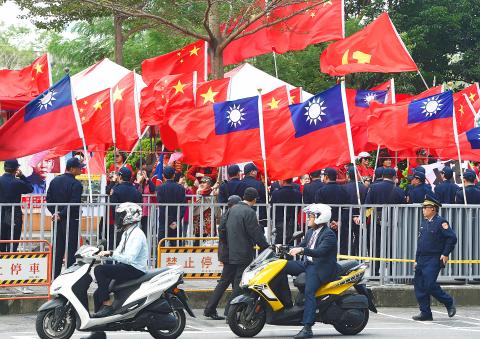Following a day of silence, the Chinese Nationalist Party (KMT) yesterday issued a statement challenging Chinese President Xi Jinping’s (習近平) definition of the so-called “1992 consensus,” saying that the “one country, two systems” framework is not part of the consensus.
“Xi’s remarks about a Taiwan version of the ‘one country, two systems’ model is not part of the content espoused by the ‘1992 consensus.’ Given that both sides of the Taiwan Strait are governed by separate governments, the ‘one country, two systems’ model unfortunately would not receive the support of the majority of Taiwanese,” the statement said.
Reiterating its definition of the “1992 consensus,” the KMT said that it was reached by the Straits Exchange Foundation and the Association for Relations Across the Taiwan Straits after they were authorized in November 1992 to engage in negotiations on the matter.

Photo: Liao Chen-huei, Taipei Times
In essence, the “1992 consensus” means that both sides of the Taiwan Strait adhere to the “one China” principle, but are allowed to have their own interpretations of what “China” means, it said.
“The ‘1992 consensus’ not only reflects the nature of cross-strait relations, which is seeking common ground while respecting differences, but also underlines the objective reality [of the ties] and conforms to both sides’ regulations,” the KMT said.
The statement came after Xi on Wednesday included “national unification” as part of his definition of the “1992 consensus” in a speech in Beijing to mark the 40th anniversary of the 1979 “Message to Compatriots in Taiwan,” which called for the unification of “China,” an end to military confrontation across the Taiwan Strait and expanded cross-strait interactions.
Xi also announced a plan to explore a Taiwan version of the “one country, two systems” model to achieve his goal of peaceful unification.
The Chinese leader’s definition of the “1992 consensus” stands in stark contrast to that provided over the years by the KMT, which has maintained that it allows room for Taiwan to interpret “China” as being the Republic of China (ROC).
The KMT’s Mainland Affairs Department on Wednesday held a meeting to discuss Xi’s speech, KMT Culture and Communications Committee acting director-general Tang Te-ming (唐德明) said.
In its statement, the KMT also reiterated its “unwavering opposition” to Taiwanese independence, saying that the ROC is already an independent sovereign state according to its Constitution.
“Cross-strait interactions and development must continue to move forward peacefully, because it is the hope of the public that both sides can expand and deepen their exchanges,” the KMT said, adding that the party, its caucus and local government leaders all look forward to making concerted efforts to ensure the peaceful development of cross-strait relations and a win-win situation for both sides.

MORE VISITORS: The Tourism Administration said that it is seeing positive prospects in its efforts to expand the tourism market in North America and Europe Taiwan has been ranked as the cheapest place in the world to travel to this year, based on a list recommended by NerdWallet. The San Francisco-based personal finance company said that Taiwan topped the list of 16 nations it chose for budget travelers because US tourists do not need visas and travelers can easily have a good meal for less than US$10. A bus ride in Taipei costs just under US$0.50, while subway rides start at US$0.60, the firm said, adding that public transportation in Taiwan is easy to navigate. The firm also called Taiwan a “food lover’s paradise,” citing inexpensive breakfast stalls

US PUBLICATION: The results indicated a change in attitude after a 2023 survey showed 55 percent supported full-scale war to achieve unification, the report said More than half of Chinese were against the use of force to unify with Taiwan under any circumstances, a survey conducted by the Atlanta, Georgia-based Carter Center and Emory University found. The survey results, which were released on Wednesday in a report titled “Sovereignty, Security, & US-China Relations: Chinese Public Opinion,” showed that 55.1 percent of respondents agreed or somewhat agreed that “the Taiwan problem should not be resolved using force under any circumstances,” while 24.5 percent “strongly” or “somewhat” disagreed with the statement. The results indicated a change in attitude after a survey published in “Assessing Public Support for (Non)Peaceful Unification

PLUGGING HOLES: The amendments would bring the legislation in line with systems found in other countries such as Japan and the US, Legislator Chen Kuan-ting said Democratic Progressive Party (DPP) Legislator Chen Kuan-ting (陳冠廷) has proposed amending national security legislation amid a spate of espionage cases. Potential gaps in security vetting procedures for personnel with access to sensitive information prompted him to propose the amendments, which would introduce changes to Article 14 of the Classified National Security Information Protection Act (國家機密保護法), Chen said yesterday. The proposal, which aims to enhance interagency vetting procedures and reduce the risk of classified information leaks, would establish a comprehensive security clearance system in Taiwan, he said. The amendment would require character and loyalty checks for civil servants and intelligence personnel prior to

The China Coast Guard has seized control of a disputed reef near a major Philippine military outpost in the South China Sea, Beijing’s state media said, adding to longstanding territorial tensions with Manila. Beijing claims sovereignty over almost all of the South China Sea and has waved away competing assertions from other countries as well as an international ruling that its position has no legal basis. China and the Philippines have engaged in months of confrontations in the contested waters, and Manila is taking part in sweeping joint military drills with the US which Beijing has slammed as destabilizing. The Chinese coast guard